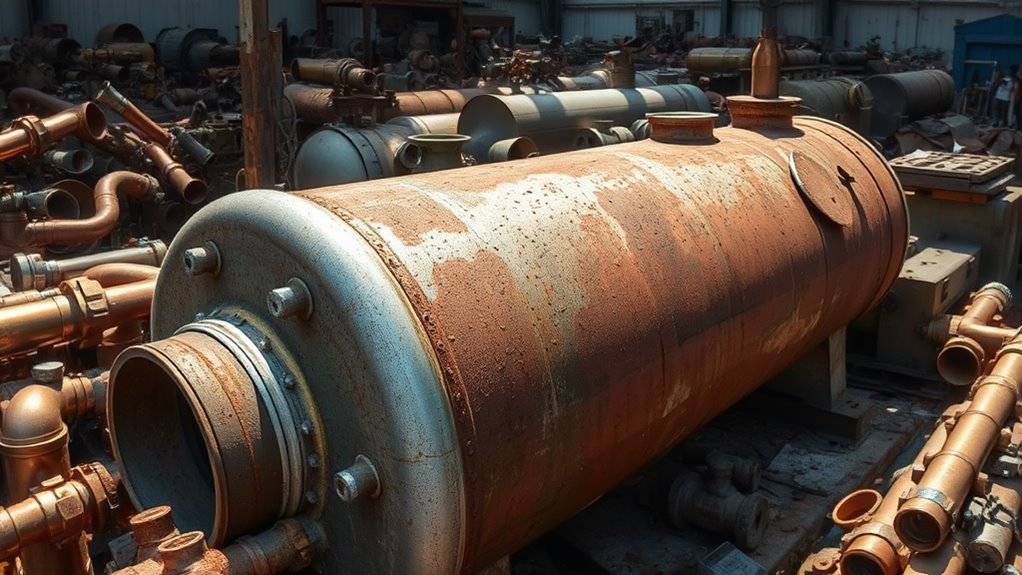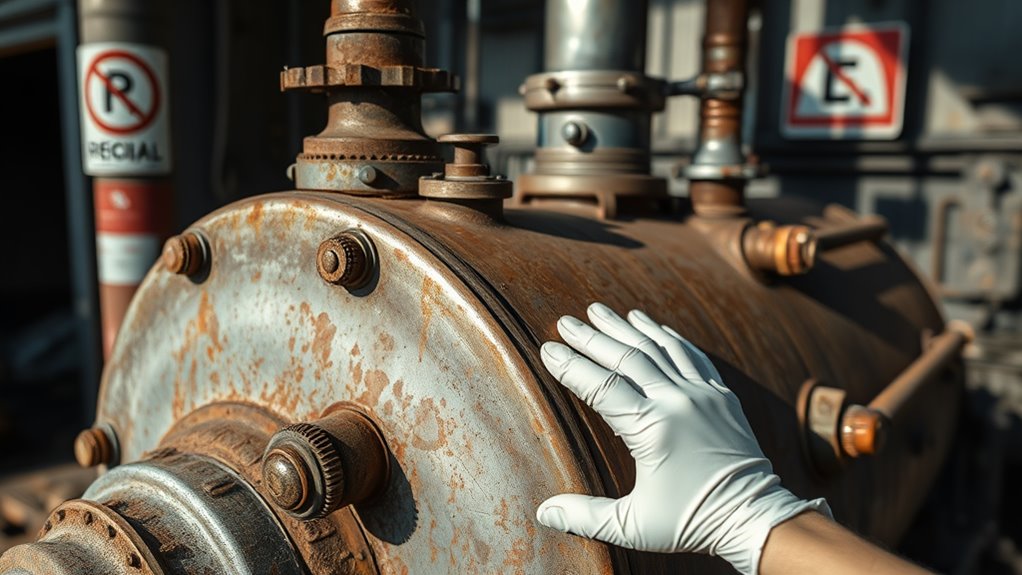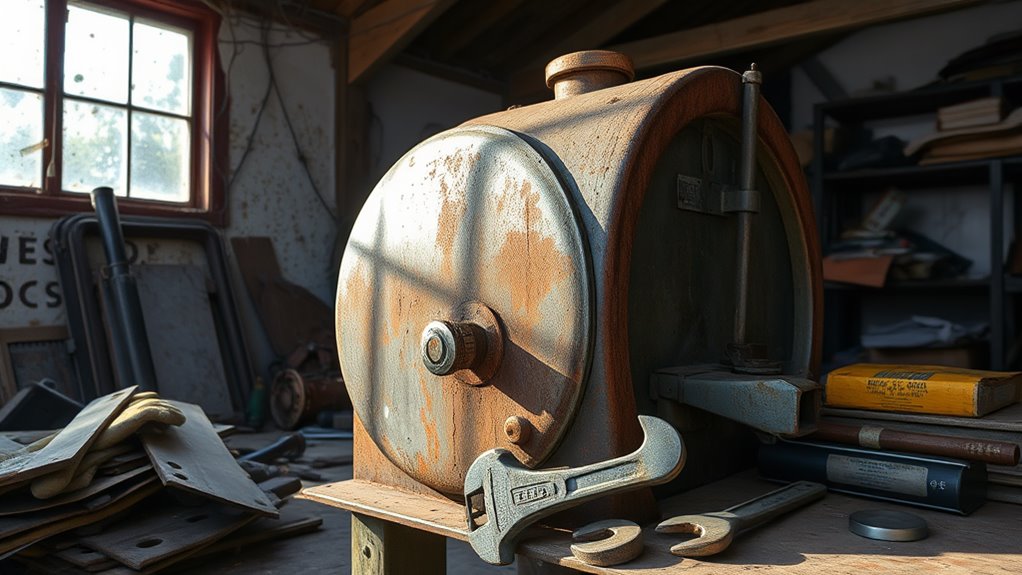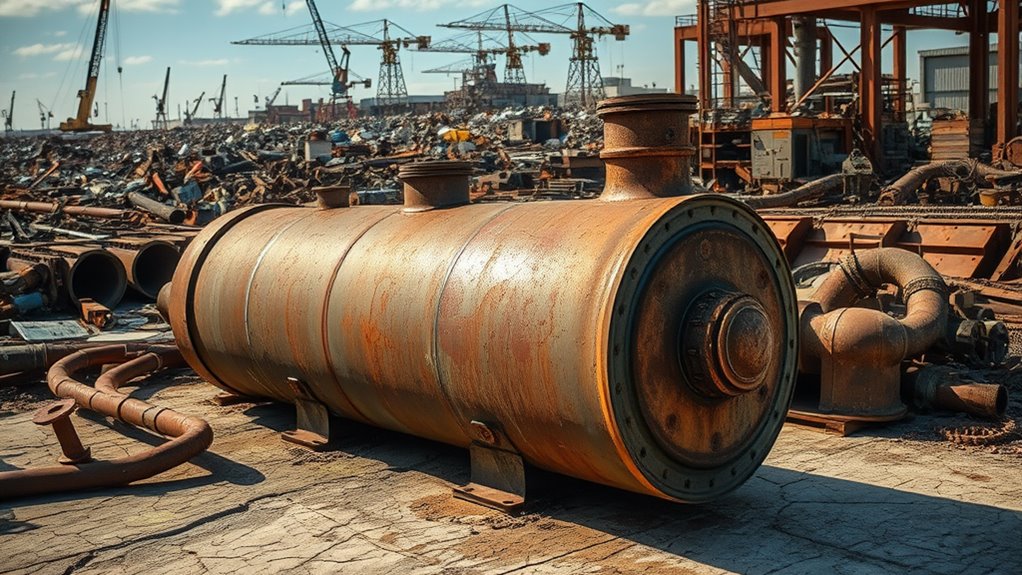Yes, you can sell your old boiler for scrap and potentially make some money. The value depends on the metal composition and condition of the boiler, with cast iron, copper, and aluminum typically offering higher returns. It's important to research local scrap yards, understand regulations, and safely prepare your boiler for sale. By knowing what influences scrap prices, you can negotiate a better deal. Discover more insights on maximizing your boiler's scrap value.
Key insights
- Yes, you can sell your old boiler for scrap, especially if it contains valuable metals like copper and aluminum.
- Check local regulations and ensure compliance when selling scrap to licensed dealers.
- Assess the boiler's condition and materials to determine its potential scrap value.
- Research local scrap yards for competitive rates and consider weight and handling fees.
- Recycling your old boiler benefits the environment by reducing waste and conserving resources.
Understanding the Value of Scrap Metal

When it comes to selling an old boiler for scrap, understanding the value of scrap metal is essential. You'll want to stay updated on current pricing trends, as they can greatly impact how much you'll earn. Scrap metal prices fluctuate based on market demand, regional factors, and global economic conditions. Copper and aluminum typically fetch higher prices, while other metals may not hold as much value. Researching local scrap yards and comparing their rates can give you a clearer picture of what you can expect. Additionally, knowing the composition of your boiler can help you negotiate better, ensuring you get the most out of your scrap metal sale. Stay informed, and you'll maximize your profit. Additionally, consider the energy-efficient heating benefits of upgrading to a heat pump system, as it can significantly reduce operational costs in your commercial property.
Types of Boilers and Their Scrap Potential

Although various types of boilers exist, their scrap potential can differ greatly based on materials and design. For instance, cast iron boilers often hold higher scrap value due to their durable composition, making them a popular choice among scrap dealers. Steel boilers, while still valuable, typically offer lower scrap potential because they contain less precious metal. On the other hand, copper and aluminum components found in certain designs can greatly enhance the overall scrap value. When evaluating your old boiler, consider its type and material composition to maximize your return. Understanding these boiler types and their scrap potential will help you make informed decisions and potentially boost your earnings when selling for scrap. Regular commercial boiler service can also ensure that you are aware of the best time to sell your boiler based on its condition and market value.
Regulations and Legal Considerations

Before you sell your old boiler for scrap, it's important to understand the regulations and legal considerations that may impact the process. Compliance requirements and safety standards vary by location, so you'll want to familiarize yourself with these key points:
- Local Laws: Check your municipality's regulations regarding scrap metal sales.
- Licensing: Make sure the scrap dealer is licensed and compliant with local laws.
- Environmental Regulations: Be aware of any hazardous materials in your boiler that need special handling.
- Documentation: Keep records of the sale for potential future inquiries. Additionally, ensure that the boiler has been inspected for safety compliance to avoid any legal issues related to gas safety regulations.
Preparing Your Boiler for Sale

Understanding the regulations and legal considerations is just the first step; now it's time to get your old boiler ready for sale. Start by guaranteeing you take necessary safety precautions. Isolate the boiler from any power or fuel sources and let it cool completely. Next, familiarize yourself with boiler disassembly techniques. Carefully remove components like pipes, valves, and insulation, as these can add to the scrap value. Use appropriate tools for disassembly and wear protective gear to avoid injuries. Document the condition of each part, as this can impact your selling price. By preparing your boiler properly, you maximize its scrap potential and guarantee a smoother transaction when you're ready to hand it off to a buyer. Regular maintenance of your boiler can also enhance energy efficiency and potentially increase its resale value.
Finding a Scrap Yard or Buyer

Where can you find the best scrap yard or buyer for your old boiler? Start by exploring your local options. Knowing where to look can help you maximize your profit. Here are some effective strategies to find reliable buyer options:
- Research Local Scrap Yards: Look for scrap yards in your area that specialize in metal recycling.
- Check Online Listings: Websites like Craigslist or Facebook Marketplace may have buyers looking for scrap metal.
- Ask for Referrals: Friends or family who've sold scrap can provide recommendations.
- Compare Prices: Contact multiple yards to get quotes and verify you're getting a fair deal. Additionally, consider the potential benefits of energy efficiency optimization from modern systems when deciding whether to upgrade or scrap your old boiler.
Factors That Influence Scrap Prices
When you're looking to sell your old boiler for scrap, it's essential to understand how metal type and market demand impact the price you'll receive. Different metals have varying values, with copper and aluminum typically fetching more than steel. Additionally, fluctuations in market demand can greatly affect prices, so staying informed can help you maximize your earnings. Furthermore, energy-efficient heating systems not only reduce costs but can also increase the overall value of the materials when scrapped.
Metal Type Value
The type of metal your old boiler contains plays an essential role in determining its scrap value. Understanding the metal composition helps you maximize your earnings. Here are four key factors that influence scrap prices:
- Copper Content: High copper content can greatly boost your boiler's value due to its demand in electrical wiring.
- Aluminum Alloys: Boilers with aluminum alloys are also valuable, but their worth depends on the specific alloy type.
- Steel Quality: The quality of steel used in the boiler affects its market price; higher-grade steel commands better rates.
- Weight: Heavier boilers generally yield more value, as scrap yards pay by weight.
Regularly assessing the boiler for common error codes can help you identify any issues that might affect its metal composition value. Knowing these elements can help you negotiate better when selling your old boiler for scrap.
Market Demand Fluctuations
Understanding market demand fluctuations is essential for anyone looking to sell an old boiler for scrap. These fluctuations are influenced by various factors, including market trends and the economic impact of global events. For instance, when construction booms, the demand for scrap metal tends to rise, driving prices up. Conversely, during economic downturns, you might find prices dropping as demand wanes. Seasonal changes also play a role; winter often sees an increase in scrap demand due to heating needs. Keeping a close eye on these trends helps you time your sale for maximum profit. By staying informed, you can guarantee you're not just selling scrap but maximizing its value based on current market conditions. Additionally, it's important to consider the efficiency of heating systems that may affect the overall scrap value of old boilers, as newer models are often more sought after.
Tips for Getting the Best Deal
To get the best deal when selling your old boiler, start by understanding its value in the scrap market. Research local scrap yards to compare prices and services, as this can greatly impact your overall profit. By being informed and strategic, you can guarantee you're not leaving money on the table. Additionally, consider the common causes of issues like error codes when assessing the boiler's condition, as this can affect its resale value.
Know Your Boiler's Value
When it comes to selling your old boiler, knowing its value can make a significant difference in the deal you secure. To maximize your profit, consider these key factors:
- Boiler Condition: Assess your boiler's functionality and appearance. A well-maintained unit will fetch a higher price.
- Material Type: Different metals have varying scrap pricing. Copper and brass usually yield more than cast iron or steel.
- Market Trends: Keep an eye on local scrap pricing fluctuations. Timing your sale can impact your earnings.
- Documentation: If available, provide maintenance records or manuals, as these can enhance perceived value. Additionally, understanding error codes can help you address any potential issues before selling, ensuring you present your boiler in the best condition possible.
Find Local Scrap Yards
Finding local scrap yards is essential for securing the best deal on your old boiler, and there are several strategies to enhance your experience. Start by checking local listings online to identify scrap yards in your area. Once you've got a list, reach out to multiple yards for quotes. This price comparison can reveal significant differences in what each yard offers, helping you maximize your profit. Don't hesitate to ask about their policies on weight and handling fees, as these can impact your final payout. Finally, consider visiting the yards in person to gauge their professionalism and customer service, ensuring you feel comfortable when selling your scrap. With these tips, you're well on your way to getting the best deal possible!
Environmental Benefits of Recycling Your Boiler
Recycling your old boiler not only helps you clear out space but also greatly reduces environmental impact. By choosing to recycle, you're actively contributing to a more sustainable future. Here are some key recycling benefits:
- Resource Conservation: Recycling metals and components reduces the need for virgin materials, preserving natural resources.
- Energy Savings: It takes less energy to recycle materials than to produce new ones, lowering overall energy consumption.
- Waste Reduction: Recycling decreases landfill waste, minimizing environmental pollution and habitat destruction.
- Carbon Footprint: By recycling, you help lower greenhouse gas emissions associated with manufacturing new products.
Frequently Asked Questions
Can I Sell a Non-Working Boiler for Scrap?
You can definitely sell a non-working boiler for scrap, as it's made of valuable materials like steel and copper. Scrap yards typically pay based on the weight and type of boiler materials, so you'll want to check the current market rates to estimate its scrap value. Just make sure to remove any non-metal components and follow local regulations for disposal. Turning your old boiler into cash is a smart move!
What Safety Precautions Should I Take When Selling My Boiler?
When you're selling your boiler, it's essential to prioritize boiler safety and adhere to scrap regulations. First, make certain the boiler is fully drained and disconnected from any utilities. Wear protective gear, like gloves and goggles, to prevent injuries. Research local scrap regulations to avoid legal issues, and find a reputable scrap dealer. Properly documenting the sale can also protect you from liability, so keep all records organized and accessible for future reference.
Are There Specific Times When Scrap Prices Are Higher?
Scrap prices can vary considerably based on market trends and seasonal fluctuations. You'll find that prices often peak during periods of high demand for raw materials, like when construction projects ramp up. Additionally, winter months can see a rise in prices as demand for metals increases. Staying informed about these trends will help you time your sale effectively, ensuring you get the best possible return for your scrap materials.
Can I Remove Parts From the Boiler Before Selling It?
You can definitely remove parts from the boiler before selling it. In fact, certain boiler parts can markedly increase its scrap value. By detaching valuable components like copper pipes or aluminum parts, you maximize your potential earnings. Just make sure you're compliant with any local regulations regarding scrap metal sales. When you've separated those parts, you'll have a better chance of getting a higher price for the remaining boiler shell, too.
How Do I Transport My Boiler to the Scrap Yard?
Transporting your boiler to the scrap yard requires a bit of planning. First, gather some solid boiler transportation tips, like using a dolly or securing it in a truck. Make sure you follow scrap yard guidelines, such as checking their accepted materials and weight limits. If it's heavy, consider enlisting help to avoid injuries. Remember to wear gloves and protective gear while handling it for safety. Proper preparation can make the process smoother!
Summary
Selling your old boiler for scrap can be a smart move, both financially and environmentally. By understanding its value and preparing it properly, you can maximize your profits while contributing to recycling efforts. Just remember to check local regulations and shop around for the best prices. With a bit of effort, you'll not only clear space in your home but also make a positive impact by ensuring that valuable materials are reused.

